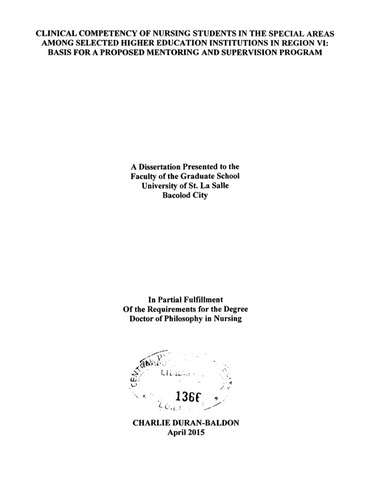Clinical competency of nursing students in the special areas among selected higher education institutions in Region VI: Basis for a proposed mentoring and supervision program

Page views
2,652Petsa
2015May-akda
Tagapayo ng Tesis
Tagapangulo ng Panel ng Depensa
Miyembro ng Defense Panel
Magbahagi
Metadata
Ipakita ang buong tala ng item
Abstract
The purpose of this study was to evaluate the clinical competency of nursing students in the operating room, delivery room and nursery among selected Higher Education Institutions in Region VI based on the eleven key areas of responsibility as mandated by the CMO No. 14, series of 2009. This study employed a mixed method comprising quantitative and qualitative approaches. A descriptive-evaluative design was conducted to determine the clinical competency of nursing students in the special areas among selected Higher Education Institutions in Region VI. The participants of the study were composed of nursing students, clinical instructors and head nurses. Modified evaluation tools were used to determine the clinical competency of students in the operating room, delivery room and nursery. To validate and confirm the quantitative data on the level of clinical competencies in the operating room, delivery room and nursery, an in depth one on one interview using an interview guide was utilized. The data were scored, classified and subjected to computer-processed statistics, analyzed, and interpreted. The statistical tools employed were descriptive statistics such as mean and weighted mean while t-Test at α = 0.05 level of significance was utilized for inferential analysis. Based on the findings of the study, the student’s assessment of their clinical skills was very good in the operating room, delivery room and nursery. They revealed that they can function with minimum guidance and are highly competitive in performing the mandated competencies. However, the clinical instructor’s assessment of the nursing students’ competency in the operating room, delivery room and nursery varies from that of the students. They reflected that students were not yet ready to perform the mandated competencies. Therefore, students’ assessment of clinical competency was significantly different from that of the clinical instructors in the operating room and delivery room as shown in the p-value of 0.001 and 0.015. However, in the nursery, there was no significant difference with p-value of 0.061. On the experiences encountered by the students as observed by their head nurses, the following actions will help in strengthening the competencies of the students: involvement of the students, updating current trends, inculcating values, organizing work, proper interaction and communication, appropriate guidance, step by step orientation and consistency. Based on the findings of the study, a proposed mentoring and supervision program was formulated.
Paglalarawan
Abstract only
Mungkahing Sipi
Baldon, C. D. (2015). Clinical competency of nursing students in the special areas among selected higher education institutions in Region VI: Basis for a proposed mentoring and supervision program (Unpublished Doctoral dissertation). University of St. La Salle, Bacolod City.
Uri
DissertationMga Paksa
Kagawaran
Graduate SchoolDegree
Doctor of Philosophy in NursingLokasyon ng Istante
GSL Theses 610.73072 B193
Pisikal na paglalarawan
331 leaves
Collections
- Dissertations [2]

